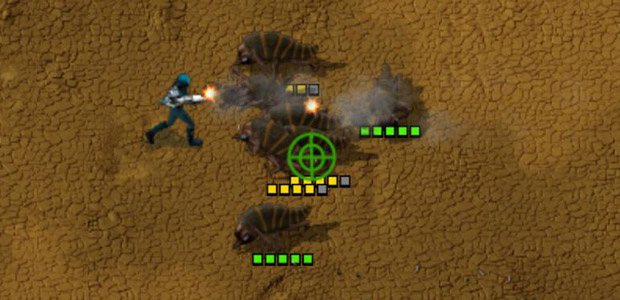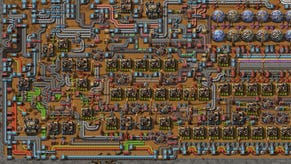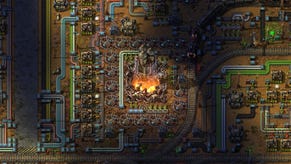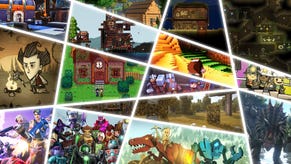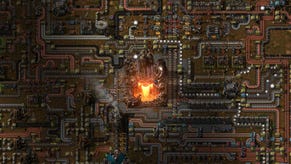Factorio: The End Of Management Games
Where can building games possibly go after this?
Show's over, building games. It's time to go home.
Seriously: I can't think where there is left to go after Factorio [official site]. It pushes the concept of resource-management to such an extreme that anything that does anything less risks seeming underwhelming, while anything which tries to go further could well be overwhelming. We're talking dozens of conveyor belts, hundreds of robotic arms, thousands of chunks of ore, and constructions quite possibly in the millions. It's a remarkable thing. A ridiculous thing. My first instinct, when I saw screenshots, was to run into a corner and mutter rude things about how Kids Today eschew artfulness in favour of absurd excess, but I couldn't have been more wrong. Factorio is both impressively artful and as accessible as most games with only a fraction of a percent of its moving parts.
It's early access, although outside of an arguably crude UI you probably wouldn't know it. I mentioned moving parts early, and not only are there bloody thousands of 'em, they all seem remarkably well-balanced too. There is absolutely nothing to stop you pulling a generous clump of hours from Factorio in its present form, and at no point could you realistically argue that it felt unfinished.
Here's how it works, although mere words cannot encapsulate the strange magic of a bloke hitting rocks in a field slowly morphing into a city-sized maze of conveyor belts and blast furnaces, the exact purpose of each you somehow retain a complete understanding of.
I honestly don't know whether Factorio is best described as a management game, a real-time strategy game, a survival game or even some strange people-free variant of a citybuilder. All of the above, but the main thing you're doing is constructing strings of machines which automatically convert one ingredient into another. For instance, iron ore becomes iron plate becomes gears becomes a component in assembly line robo-arms which feed coal into boilers which provide steam to power stations which shuttle electricity to everything.
That's just one example. That iron plate can also become endless chunks of conveyor belt, or steel girders from which railroads can be constructed. Copper can become wiring or electronics which bring turrets and automated drills to life: and those automated drills grab the coal and ore which everything depends on. And dozens of other variants, all using the same logic and, right down at the bottom, the same base materials: iron ore, copper ore, stone and wood. Sometimes I stare at the vast and thundering mechanical labyrinth that is my factory-land and shake my head in disbelief that it all began with me punching a rock.
(Oh, and I forgot to mention that your construction will regularly be assaulted by Zerg-like aliens which require turrets and some manual shooting to control, and while to some extent this is the least of your concerns, left unchecked the blighters will take out enough tiny but crucial stages of your assembly line that everything will grind to a halt, and tracing it all back to the origin problem is no mean feat).
In terms of what you'll spend most of your time doing, this is the ever-expanding circle school of management. Once a core loop - for instance, smelters being automatically fed with both coal and ore so that they will then endlessly produce iron plates - is established, it's basically happy for an eternity, unless a bug attack scores a serious hit or you manage to exhaust an ore deposit. But your next major construction goal might require twice the amount of iron, or perhaps it needs copper in the mix too.
So, you'll knock up a whole new production line which needs to be interconnected with the first one without interrupting either one's flow, both of which then feed into your next factory. The circle grows. Meanwhile you're drawing too much power so need to go throw up another bank of water pipes, boilers and steam power stations. The circle grows again. Later on you'll have access to solar panels, but oh boy do you need to build a lot of stuff to unlock the research for that one. The circle grows forever.
Conveyor belts collide into shuddering knots of automated spaghetti, creating gridlocks of coal and circuitry if the balance of anything is off, at which point life fades from all those swooping robot arms. Ironing out the knots is the hardest part of the late game, as you usually can't see them coming: something is being produced just a little faster than something else it shares a conveyor belt with, and eventually, almost imperceptibly, it means that a belt is flooded with one material and those poor, stupid arms can't reach the resources they're meant to. Nothing stops. Nothing ever stops.
So you'll race around, a tiny little spaceman in a huge metal factory-fortress, desperately wrenching bits of belt or misaligned arms out from the impossible circuit, trying to set up parallel paths or complex, automatic resource dividers to keep everything cleanly compartmentalised. It will be the most important thing in the world for ten minutes, these small, precise tweaks which only you could possibly understand, because you're the one who built this fantastic contraption, and then it will be solved and you'll forget and go off to build something else.
Then it will happen again. And the neat, ordered kernel you built your world around will gradually become this crazy, convoluted mess that looks like insanity to anyone else, but it works, and you love it, because by God you put the hours in and you made it perfect. The most beautiful moments in Factorio are those when you have to do nothing yourself - because you have crafted a colossal engine which can endlessly power itself. If your little guy has to go and harvest anything himself, then something has gone horribly wrong.
My sole serious reservation about Factorio is that the pay-offs for long, long, ridiculously long chains of automation are minor, and usually purely involve opening up a new branch of the tech tree so that you can continue the same fundamental process ad infinitum. Occasionally I wondered/worried to myself that all I was doing was playing Clicker Heroes with the numbers disguised by conveyor belts. It's not quite that, not really, not least because there's this whole strata of logistical thinking in there too - how do I make all this fit? How do I lay down this new assembly line without having to demolish everything I'd already built? How can I make sure this one belt carries the exact ratio of copper and iron that the foundries need? Even if the outcomes are essentially the same as the process which led to them, progress is not a given; it's achieved by forethought and analysis, not simply by perseverance. This is a puzzle game as much as anything else - and consequently similar to other games such as Infinifactory, which I have not played.
However, at the heart of all the construction is the concept of research, which involves feeding multiple components into a string of factories which eventually results in the production of little coloured bottles. These bottles fuel labs, which gradually unlock new toys on the tech tree - but most of that tech tree is ultimately dedicated only to unlocking more of the tech tree. There are points when I gazed at the work ahead of me, and it felt just like that: work. So much work, just to make some blue bottles that, when produced in sufficient quantities, will eventually enable me to make some purple bottles. Factorio could do with a few more 'I Made This' moments as you climb the endless ladder, but then again those moments do come when you pull back the camera and take in the scale of what you've built. Look upon my steelworks, ye mighty, and despair.
I'm also not a fan of how, when the area directly underneath a bank of automated drills empties of ore, I then have to painstakingly move everything up or down by an inch just to get back to where I was. Logically, it makes sense that ore is not infinite, but practically it's the point where Factorio switches from ingenuity to grind. A relatively minor gripe about a beautiful thing, though.
I should say that I'm not even at the end of the tech tree, nor have I yet ventured online, where I can attack and be attacked by other players in addition to competing for resources. I've spent a big chunk of my week digging into Factorio, and I know that uncharted strata still remain. That makes me happy. As does browsing Steam community screenshots and seeing incredible constructions I couldn't possibly create for myself. But, where once I gazed at those screenshots and thought I was witnessing ugly madness, now I see the poetry in the machine.
I pity anyone else making any kind of management game; I don't know where we go from here.
Factorio is in early access now, both via Steam and its own site. I played version 0.12.26.



